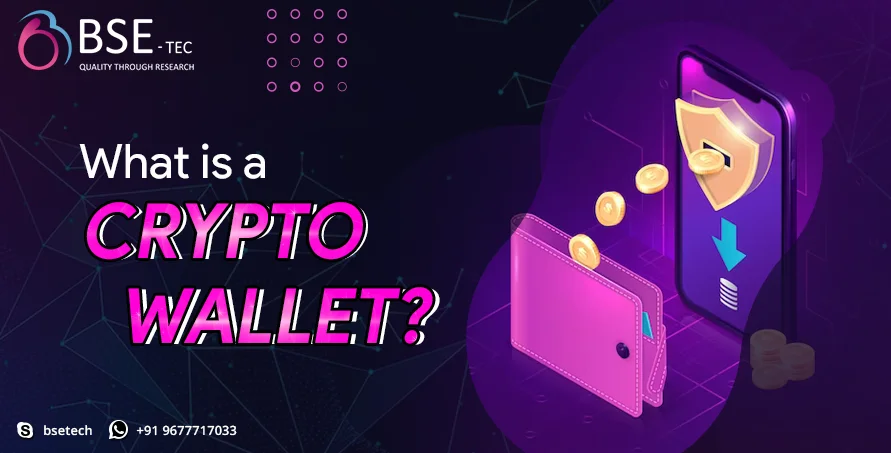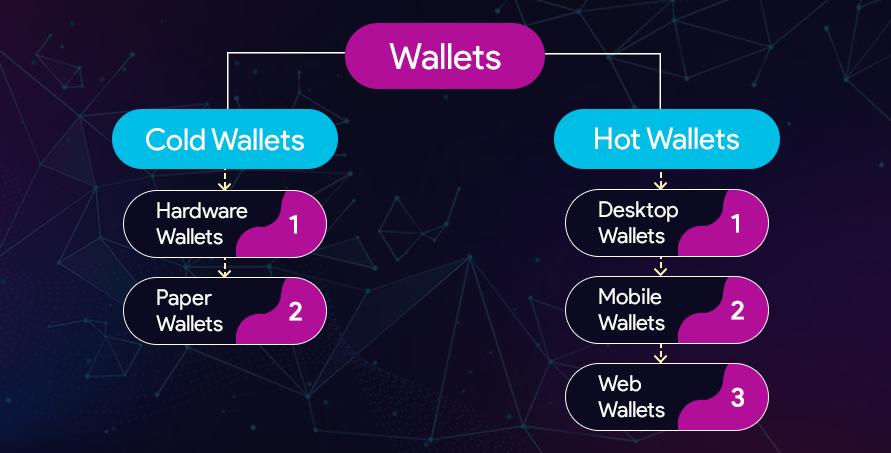What is a crypto wallet?

As millions of people are using cryptocurrencies, crypto trading, blockchain apps, and NFTs, the need for an interface to manage our cryptocurrencies and crypto assets is also required. This is solved by crypto wallets!
Cryptocurrencies
In layman’s terms, cryptocurrency is a digital or virtual currency that is designed to be used in online transactions. The most popular example of cryptocurrencies is Bitcoins. The biggest advantage of cryptocurrencies is that it is impossible to counterfeit or double-spend them.
What is a crypto wallet?
By definition, a crypto wallet is a secure digital wallet to store your cryptos! Technically, a crypto wallet is a wallet to store the private keys to your cryptocurrencies. Unlike our traditional wallets which we used to store our currencies, the crypto wallet doesn’t technically hold a user’s cryptocurrencies. Instead, it holds the key to their coins(cryptos), which are stored on public blockchain networks. Every wallet comes with a private key and a public key. The public key is similar to our bank account number which can be shared with anyone, whereas the private key is like your PIN or password that you keep to yourself.
- Public Key: A public key allows you to receive money and it is always paired with a private key.
- Private Key: Even though the public key receives the cryptocurrency that was transferred you should use your private key to prove and unlock the cryptos received.
How do crypto wallets work?
Every crypto wallet has Public and private cryptographic key pairs. The keys can be used to receive, spend, and track cryptocurrency ownership. A private key enables the spending of cryptocurrency from that address, but a public key allows payments to be made to that address.
Types of crypto wallets

- Hot Wallets: Wallets that are connected to the internet are hot wallets. Some examples of hot wallets are Desktop Wallets, Mobile Wallets, and Web-based wallets. Hot wallets are easy and convenient to use and it is the most suitable option for beginners and regular traders who need quick payment transactions. However, these hot wallets are vulnerable to attacks and are prone to hacks.
- Cold Wallets: Offline wallets that don’t require the internet for working are called cold wallets. Some of the cold wallets are hardware and paper wallets.
- Cold Wallets
- Hardware Wallets: Hardware wallets are physical devices that store your private keys offline, making them more secure than other types of wallets. Examples include Ledger, Trezor, and KeepKey.
- Paper wallets: These are physical pieces of paper that have your public and private keys printed on them. They are typically used for long-term storage and are not very convenient for regular use.
- Hot or Software Wallets: These are digital wallets that are stored on your computer or mobile device. They can be further divided into:
- Desktop Wallets: These are downloaded and installed on your computer. Examples include Exodus, Electrum, and Bitcoin Core.
- Mobile Wallets: These are downloaded and installed on your mobile device. Examples include Mycelium, BRD, and Trust Wallet.
- Web Wallets: These are hosted online and can be accessed from any device with an internet connection. Examples include MetaMask, MyEtherWallet, and Coinbase Wallet.
Why are crypto wallets important?
When you use crypto wallets, they help you to
- Manage all your cryptocurrencies and digital assets in one place.
- Control your private keys.
- Send and Receive cryptos.
- Interact with usernames instead of the long random script key.
- Browse dApps.
- HODL helps you in holding and staking cryptos.
- Shop at stores and NFT marketplaces that accept cryptocurrencies.
Wrapping Up
Even though we have different types of wallets, It’s important to choose a wallet that fits your needs and level of security. Always do thorough research and read reviews before choosing a wallet. Get in touch with BSEtec for more details or a free blockchain consultation.
Did you find this article useful? Let us know by leaving a comment below, or join us on Twitter and Facebook.




